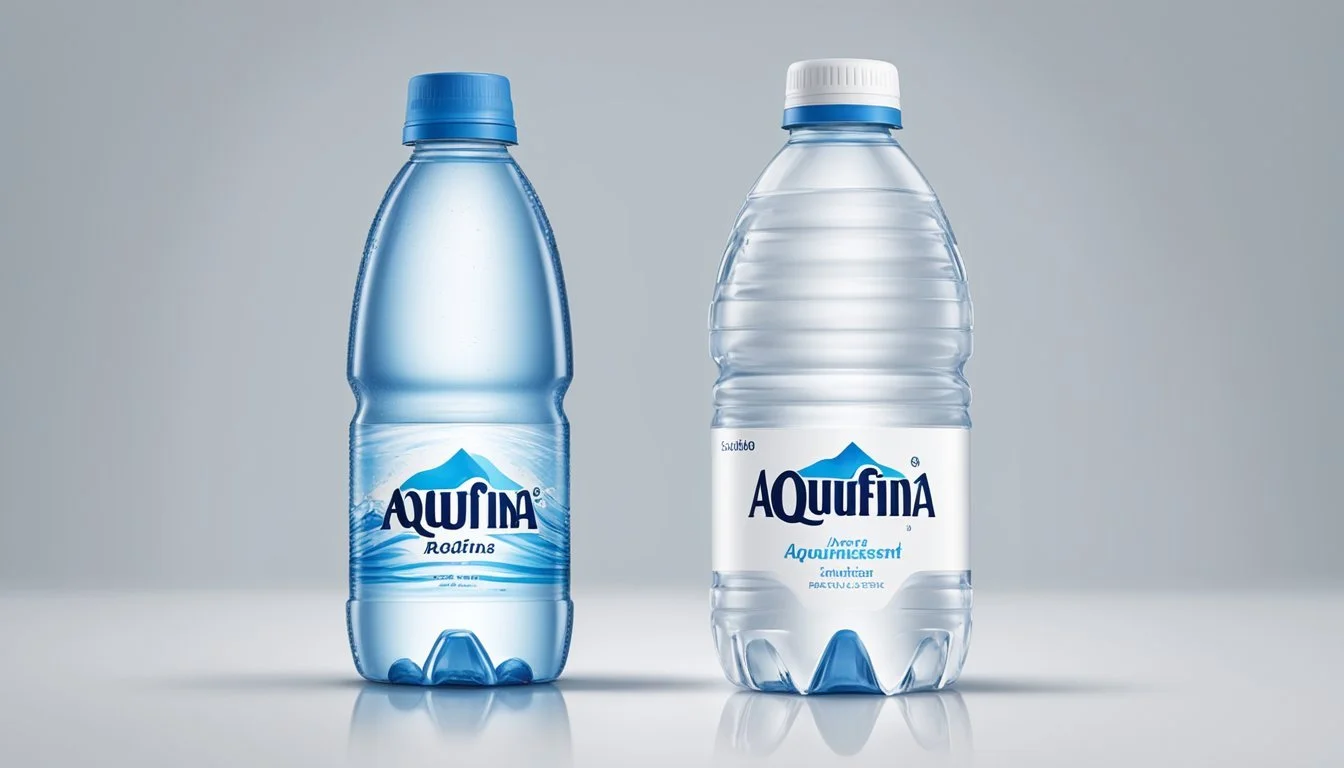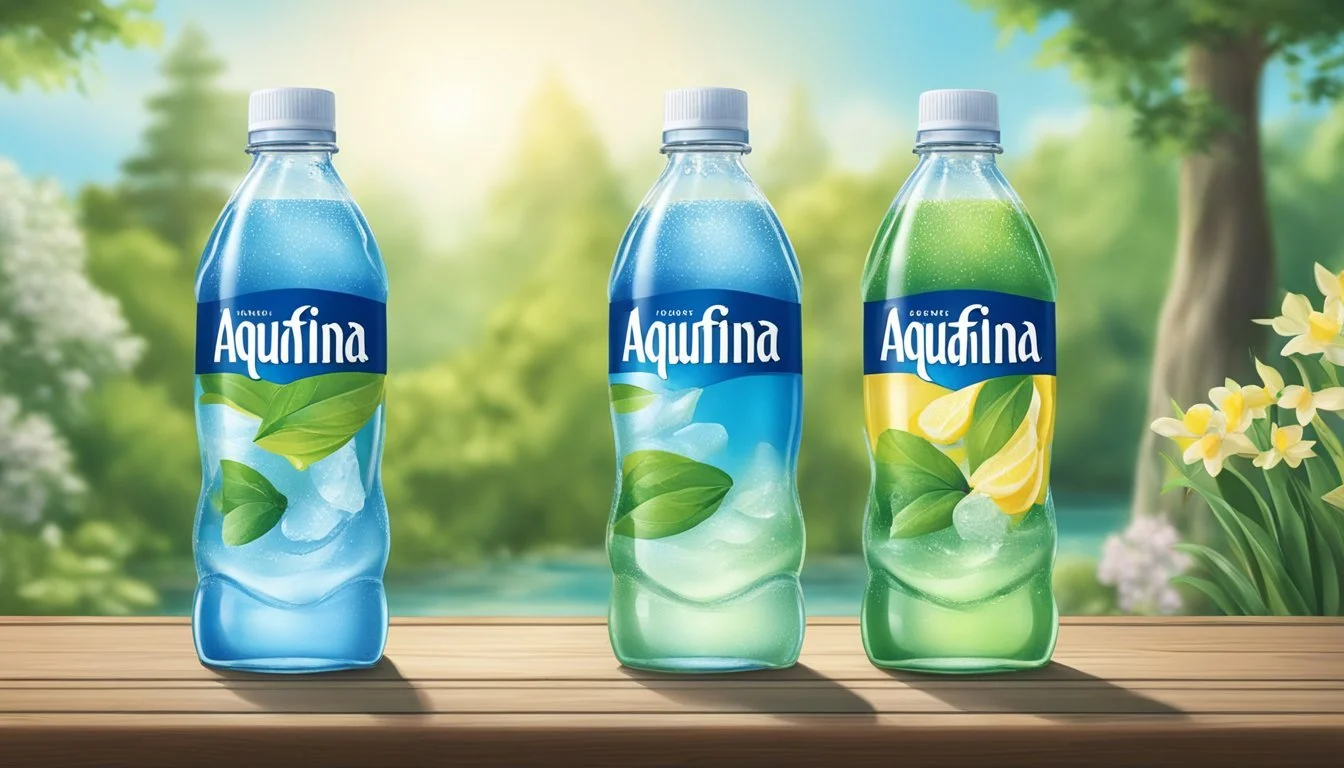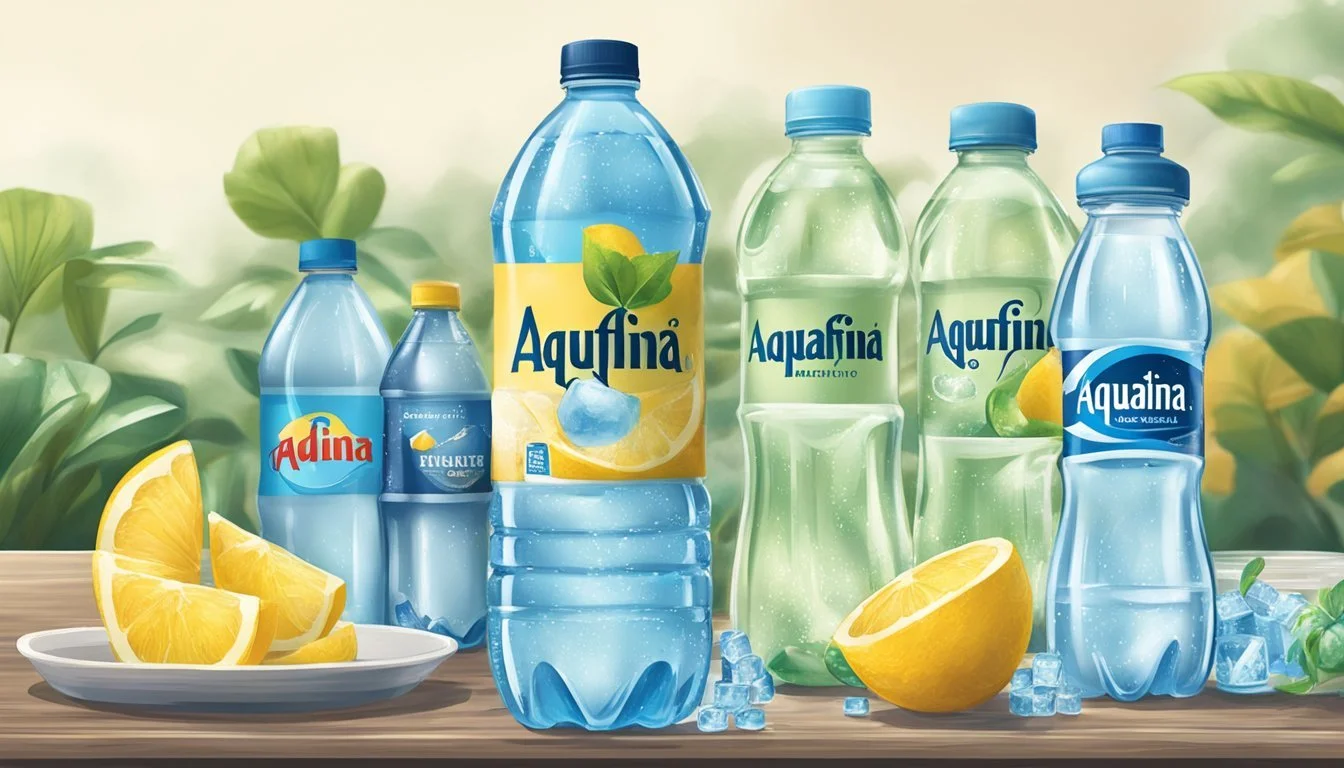Aquafina vs. Ethos
Comparing Quality, Taste, and Sustainability of Bottled Water
In the realm of bottled water, Aquafina and Ethos Water represent two prominent brands that cater to a market seeking convenience and quality. Aquafina, a well-established brand owned by PepsiCo, purifies water using a rigorous seven-step process that includes reverse osmosis. This method strips away minerals and impurities, striving to deliver purity and consistency in every bottle. Boasting a global presence, Aquafina is synonymous with accessibility and has become a go-to choice for many consumers worldwide.
Ethos Water, on the other hand, positions itself as not only a provider of clean and safe bottled water but also as a socially responsible brand. A portion of its profits is dedicated to global humanitarian efforts to provide children with access to clean water, sanitation, and education. While Ethos Water may not have the same widespread recognition as Aquafina, it attracts a socially-conscious demographic that values the brand's commitment to making a positive impact on the world.
When assessing which bottled water is superior, consumers commonly consider factors such as taste, purity, price, and the brand’s ethical stance. Both Aquafina and Ethos Water have unique selling points that can sway a consumer's preference. This comparison not only reflects on the tangible qualities of the products but also the values and missions that each brand embodies.
Bottled Water Industry Overview
The bottled water industry has experienced consistent growth, propelled by consumer demand for convenience and concerns about water quality. Brands within this sector are highly competitive, vying for market share through various strategies, including sourcing and marketing narratives.
Market Demand and Consumers
The market for bottled water has seen substantial expansion with a compound annual growth rate (CAGR) of 5.9% from 2023 according to industry forecasts. The escalation in demand is attributable to increasing health awareness among consumers, particularly related to the dangers of contaminated water and dehydration. With the rising number of health-conscious consumers, the appeal for bottled water as a portable and safe alternative to tap water fuels this industry's growth.
Consumer Preferences: Preference for premium bottled water brands that offer added health benefits, such as minerals and electrolytes, have also surged.
Market Drivers: Concerns about the contamination of municipal water supplies push consumers towards bottled waters, considered a safer choice.
Popular Bottled Water Brands
Within the robust market, certain brands have emerged as leaders based on various factors like taste, source credibility, and marketing effectiveness. The diversity in offerings caters to a range of consumer preferences, from budget-friendly to premium selections.
Budget-Friendly: Pure Life by Nestle, notable for its widespread availability and economical pricing.
Premium Brands: Brands like Evian and Smeraldina have carved out positions in the premium segment, often promoting their natural sources.
Sales Figures: Consistent sales growth reflect the popularity and consumer trust placed in leading brands. From endorsements to quality assurance, these brands have set benchmarks within the bottled water industry.
Source and Purity of Water
The quality of bottled water largely depends on the source from which it is drawn and the subsequent purification processes it undergoes. Aquafina and Ethos Water represent two brands with different approaches to sourcing and purification, highlighting the contrast between using municipal sources and natural springs.
Aquafina's Purification Process
Aquafina, a brand owned by PepsiCo, employs a rigorous purification process known as Hydro-7 which is a seven-step filtration method designed to ensure consistency and purity. This system includes:
Carbon filtration: Removing organic compounds.
Reverse osmosis: Extracting dissolved solids, metals, and other harmful substances.
Ultraviolet purification: Eliminating microbiological contaminants.
Aquafina sources its water from municipal sources, essentially starting with tap water that goes through their proprietary purification to meet and exceed regulations.
Ethos Water's Source and Filtration
Ethos Water, sourced from private company underground springs, takes a more naturalistic approach. Their water goes through a filtration process to preserve the natural minerals while removing contaminants. The details include:
Micro-filtration: Targeting larger particles.
Carbon filtration: As with Aquafina, cleaning out organic compounds.
Filtration methods ensure that spring water maintains a balance of naturally occurring minerals for taste.
Comparing Sources: Spring Water vs. Municipal Water
When assessing sources, it's important to understand the fundamental differences:
Spring Water: Typically originates from underground springs and may journey through layers of rock, acquiring minerals, which can contribute to flavor. Ethos emphasizes the natural purity of their spring water, which is often deemed superior by consumers for its taste and mineral content.
Municipal Water: Like Aquafina's, starts as tap water that is then highly treated and purified. While it may lack the natural minerals of spring water, the purification process is designed to create a product that's consistently clean and safe.
Health and Hydration
Choosing between Aquafina and Ethos bottled water is not just about taste preference—it's also about the health and hydration aspects they offer. Different brands may vary in terms of mineral content, electrolyte levels, and purity from contaminants, all of which are crucial for maintaining health and hydration.
Mineral Content and Health Benefits
Aquafina is known for its purification process, which includes reverse osmosis, stripping away not only contaminants but also the natural minerals found in water. Conversely, Ethos tries to retain some level of minerals in its water, which can be beneficial for health. Minerals such as calcium, magnesium, and potassium are essential for bodily functions, including bone health, nerve function, and overall well-being.
Aquafina: Low mineral content due to thorough purification.
Ethos: Higher mineral content, beneficial for health.
Hydration and Electrolytes
Proper hydration is not just about water intake but also about maintaining electrolyte balance. Electrolytes are minerals in your body that have an electric charge. They are vital for hydration, muscle function, and pH balance.
Aquafina: Although purified, lacks electrolytes which may affect its hydrating ability.
Ethos: May contain natural electrolytes such as sodium and potassium, aiding in better hydration.
Heavy Metals and Contaminants
The presence of heavy metals and other contaminants in drinking water can pose health risks. Consumers often rely on bottled water brands to provide a product that's free from these harmful substances.
Aquafina: Claims to remove more than 99% of common contaminants.
Ethos: Boasts a filtration process aimed at reducing contaminants while maintaining the water's natural state.
Heavy Metals/Contaminants Aquafina Ethos Lead Absent Minimal Mercury Absent Minimal Chlorine Absent Minimal
It's important to note that while both brands aim to minimize the presence of unhealthy contaminants, the methods and effectiveness of their filtration processes differ, which can affect the purity of the water.
Taste Profile
When evaluating bottled water, one must consider the taste profile, which is influenced by various factors. Two notable brands, Aquafina and Ethos, offer distinct experiences on this front.
The Role of Minerals in Taste
Minerals play a crucial role in defining the taste of water. Aquafina is known for its purity, undergoing a rigorous purification process that includes reverse osmosis and other filtration methods. This process removes most minerals, resulting in a clean and crisp taste that some consumers find lacking in complexity. Ethos, on the other hand, is sourced from springs and retains a level of natural minerals, which can impart a subtle flavor and character to the water.
Aquafina: Mineral content is significantly reduced, aiming for taste consistency.
Ethos: Natural minerals are retained, contributing to the water's unique taste profile.
Taste Comparison: Aquafina vs. Ethos
The taste of Aquafina versus Ethos water can be differentiated primarily due to the presence or absence of minerals:
Aspect Aquafina Ethos Mineral Content Low Moderate Taste Description Pure, neutral Slightly characteristic
Aquafina's taste is often described as neutral and clean, which appeals to those who prefer their water to be free of any distinct flavors. In contrast, Ethos water may offer a slight mineral taste, which can be refreshing and preferred by those who enjoy a more natural flavor profile in their water.
Environmental and Ethical Considerations
Choosing between Aquafina and Ethos bottled water involves more than just taste and hydration—it's important to consider their environmental impact and ethical initiatives.
Bottled Water and Environmental Impact
Aquafina: A product of PepsiCo, Aquafina's environmental impact largely stems from its use of plastic bottles. Plastic production and waste contribute to pollution and carbon emissions. Consumers can mitigate this by opting for reusable water bottles when possible.
Material Use:
Bottles: Primarily plastic
Packaging: Cardboard and plastic wraps
Ethos Water: While still packaged in plastic, Ethos differentiates itself by contributing a portion of each purchase to water, sanitation, and hygiene education programs in water-stressed countries. Encourages the use of boxed water as a more sustainable alternative when available.
Material Use:
Bottles: Plastic, with a push toward recyclable materials
Packaging: Emphasis on reduced waste
Comparative Environmental Impact:
Aquafina: Higher reliance on plastic without significant environmental offset programs.
Ethos Water: Some environmental impact from packaging but with tangible ethical initiatives to balance.
Ethos Water's Ethical Mission
Ethos Water was founded with a clear mission: to help provide clean water to communities in need around the world. Through their partnership with the Starbucks Foundation, they donate a portion of their profits to support water access initiatives. The brand's commitment is not only to provide clean bottled water to consumers but also to make a positive impact on a global scale.
Initiatives:
Donations for access to clean water
Support for hygiene education
Ethical Considerations: Consumers who value corporate social responsibility may find Ethos's mission aligns with their own desire to make ethical purchasing decisions. While it doesn't eliminate the environmental concerns regarding bottled water, Ethos offers a socially responsible choice for those who opt to buy bottled water.
Bottled Water Safety and Standards
When considering bottled water, consumers often look at taste and convenience, but the underlying factor of utmost importance is the safety and quality of the water. This hinges on adherence to strict regulatory standards set by authoritative bodies.
Regulatory Bodies and Water Quality
The Environmental Protection Agency (EPA) enforces regulations and standards for tap water, while the Food and Drug Administration (FDA) oversees bottled water. The safety standards include permissible levels of various contaminants, ensuring the water is fit for human consumption. These bodies require regular testing for:
Microbial pathogens: to prevent waterborne diseases.
Organic and inorganic chemicals: to limit exposure to potentially harmful substances.
Radiological hazards: to measure and control exposure to radiation.
Bottled water companies must comply with these standards and often conduct their own additional tests to ensure safety.
Comparison of Safety Standards
Comparing the safety standards between Aquafina and Ethos reveals similarities, as both brands must meet the minimum requirements set by the FDA for bottled water. However, some companies choose to apply more stringent measures. Aquafina, for example, states that its water undergoes a rigorous purification process:
HydRO-7™ filtration: This includes reverse osmosis and other filtering methods to reduce potential contaminant levels.
Ethos Water, which is owned by Starbucks, follows FDA safety standards and promotes its commitment to providing clean and safe drinking water. Both brands are expected to comply with:
FDA's Quality Standards: Maximum contaminant levels are established.
Labeling Requirements: Accurate information must be present on the packaging.
In conclusion, the consumer can generally trust that bottled water brands such as Aquafina and Ethos, available in the US market, adhere to established safety standards and regulations enforced by the FDA, with the common goal of protecting public health.
Bottled Water in Popular Culture and Media
The prominence of bottled water brands in popular culture is substantial, with their influence extending from social media platforms to prominent product placements in media. This visibility often shapes consumer perception and brand popularity.
Online Presence and Social Media
Aquafina and Ethos Water maintain active online profiles, particularly on Twitter and YouTube, to engage with their customers. Aquafina leverages Twitter to promote its water's purity and quality, often tweeting about the brand's filtering process. Ethos Water highlights its mission to provide clean water to those in need, using social media platforms to convey messages regarding global water issues.
Twitter: Aquafina uses hashtags like #PureWater and #ForTheThirsty to increase engagement.
YouTube: Ethos Water shares stories of its charitable contributions and the communities it supports.
Product Placement and Endorsements
Both brands have strategically placed their products within television shows and movies to maximize visibility. Aquafina has been featured in prominent reality shows and talk shows, subtly endorsing the brand through visual cues. Ethos Water aligns itself with celebrities committed to social causes to bolster its image of corporate social responsibility.
Endorsements: Celebrity endorsements are selectively used to resonate with Ethos Water's charitable image.
Product Placement: Television and films serve as platforms for Aquafina to display its products to vast audiences.
Packaging and Convenience
When choosing between Aquafina and Ethos, consumers may consider packaging design and materials alongside their convenience for on-the-go hydration.
Bottles: Types and Materials
Aquafina utilizes lightweight plastic bottles that are recyclable. Their production process includes a seven-step purification system, which suggests a focus on purity, but the bottles themselves do not promote any specific eco-friendly claims, such as reduced plastic usage or incorporation of recycled materials. Ethos Water, however, adds a social-consciousness angle to their brand, as they use part of their proceeds to fund water programs in developing countries. Packaging discussions regarding Ethos often emphasize this charitable aspect, although specifics on the materials used for Ethos bottles are not prominently advertised.
Concerns about BPA (Bisphenol A) in plastics are prevalent among consumers. Many bottled water brands, including Aquafina, assure customers that their bottles are BPA-free, aiming to alleviate health concerns associated with the chemical.
The Convenience Factor
Both brands offer bottled water that caters to the need for convenience. Aquafina bottles are found in a variety of sizes, making them readily available and convenient for various needs, from a quick gym session to stocking up for a road trip. They are easily found in numerous retail locations, which adds to their accessibility.
Ethos bottles come in a standard size that is easy to carry, and they're typically sold in Starbucks stores, providing a convenient pick-up point for coffee lovers or those who frequent these outlets. However, their availability might not be as widespread as Aquafina, especially in non-Starbucks retail locations.
Packaging and convenience play significant roles in a consumer's choice of bottled water, and both Aquafina and Ethos offer distinct takeaways in these arenas.
Comparative Analysis and Conclusion
In determining which bottled water brand outperforms the other, it is essential to consider factors like taste, quality, source, and contribution to social causes. This section will provide a detailed comparison between Aquafina and Ethos Water.
What Makes the Best Bottled Water?
The best bottled water is typically characterized by its purity, taste, and the source from which it is derived. Additional factors include the bottling process and the brand's impact on the environment. Here's how Aquafina and Ethos stack up:
Purity: Aquafina employs a rigorous purification process, including reverse osmosis. Ethos Water undergoes a multi-step filtration and purification process.
Taste: Taste is subjective; however, pure water should have a clean, crisp taste free from distinct flavors or odors.
Source: Aquafina uses public water sources, while Ethos Water sources from springs.
Environmental Impact: Ethos makes a point of its charitable contributions, providing a portion of its profits to water-related causes in developing countries.
Final Verdict: Aquafina vs. Ethos
When choosing between Aquafina and Ethos Water, buyers may consider the following:
Aquafina is known for its consistent taste and wide availability. It appeals to those seeking a pure and clean-tasting water that undergoes extensive treatment to ensure quality.
Ethos Water distinguishes itself with a social conscience, contributing to global water access initiatives. It appeals to those who prioritize ethical considerations alongside quality.
Each brand has its merits, catering to different priorities in the bottled water market. Consumers are encouraged to consider their personal values and taste preferences in making an informed decision. Both brands provide quality hydration options, with Ethos taking a lead for those who support social initiatives through their purchases.





